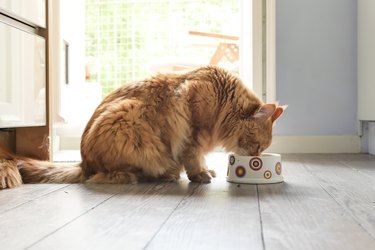
Just like in humans, your cat's kidneys are important for her health. In humans, kidneys filter blood and remove waste and excess water, which is turned into urine. Because of this important water-filtering function, urine flow actually starts with the kidneys. Kidney disease in cats is very similar to what happens in humans.
A condition called CKD, or chronic kidney disease, is the most common kidney problem that can affect cats. While it can happen at any age, CKD is more common in cats over 10 years old, according to VCA Hospitals. Cats who have kidney disease experience a buildup of the waste products that the kidneys normally filter out. This can leave your pet losing weight and feeling lethargic, with unkempt hair.
Video of the Day
Video of the Day
Kidney diet for cats
A kidney diet for cats focuses on lowering the amount of work that the kidneys have to do to remove waste. According to the veterinary professionals at Hill's Pet Nutrition, a good kidney diet for cats with kidney disease at any stage is low in protein and low in phosphorous. The right kind of protein also makes a big difference.
Two big factors in a kidney diet for cats are making sure your cat is getting enough water and reduced phosphorous intake. The Feline Nutrition Foundation explains that this is because cats with kidney disease are at a higher risk of becoming dehydrated due to the reduced ability of the kidneys to adequately filter water. Instead of filtering the water and letting the cat's body use it, the damaged kidneys send all the water through as urine. Therefore, it is recommended that food for cats with kidney disease be of the wet and/or raw variety rather than dry.
Cummings Veterinary Medical Center at Tufts University says that reducing phosphorous is key because less phosphorous is thought to slow the progression of kidney disease.
Homemade kidney care cat food
The Feline Nutrition Foundation recognizes that cats are carnivores and therefore should have a meat-based diet. However, some meats are high in phosphorous, which is not recommended for cats with CKD. They recommend rabbit, hare, and poultry as easy-to-digest proteins. Supplementing a homemade kidney care cat food with omega-3 fatty acids, B vitamins, and potassium has also shown good results.
VCA Hospitals gives an appropriate ratio of protein to phosphorous in a homemade kidney care cat food:
Protein: 28 to 35 percent
Phosphorus: 0.3 to 0.6 percent
Sodium: ≤ 0.4 percent
Omega-3 fatty acids: 0.4 to 2.5 percent
It may be necessary to work with your veterinarian as you start making your homemade food for cats with kidney disease to be sure you are giving your cat the right ratios. If needed, water, tuna juice, or low-sodium chicken broth can be added to the food to make your cat more interested in eating it.
Beware of tuna
While cats do love tuna, and the juice squeezed from a can of tuna can make your cat want to eat, a diet of tuna might not be recommended. According to DaVita Kidney Care, canned tuna has 130 milligrams of phosphorous, which makes tuna a low-phosphorous food. (Skinless turkey breast has 185 milligrams, for example.)
But 1800PetMeds suggests that canned tuna is not a healthy choice because of the high levels of mercury in tuna, the added ingredients in canned tuna, and the fact that some cats have a sensitivity to fish. They suggest keeping canned tuna as an occasional treat. So, while tuna is a low-phosphorous food, too much may not be a good thing. If you feed your cat tuna, make sure the ratio is within the acceptable levels when compared with what else you are feeding him.
Kidney care cat food
The Feline Nutrition Foundation says that cooked egg whites are a high-protein, low-phosphorous food that can be substituted for some meats in homemade kidney care cat food. Using this substitution can lower the phosphorous when compared to other meats. For example, the phosphorous content of 100 grams of cooked egg whites is 15 milligrams, whereas 100 grams of raw chicken has 198 milligrams of phosphorus, and 100 grams of raw beef has 177 milligrams of phosphorus.
Always check with your veterinarian before changing your pet’s diet, medication, or physical activity routines. This information is not a substitute for a vet’s opinion.
- VCA Hospitals: Nutrition for Cats With Chronic Kidney Disease
- Hill's Pet Nutrition: Tips for Managing Your Cat's Kidney Disease
- Feline Nutrition Foundation: Phosphorous Can Be Key For Kidneys
- Cummings Veterinary Medical Center at Tufts University: My Pet Has Kidney Disease – What Kind of Diet Should I Feed?
- Feline Nutrition Foundation: A Diet for Urinary and Kidney Health
- Davita Kidney Care: Top Low-Phosphorus Food Choices for a Kidney Diet
- 1800PetMeds: Is Tuna Bad For Cats